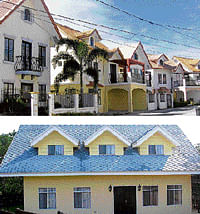Not only would it reduce construction costs, but also slash interest rates by almost 30 pc. Surprised? Don’t be because that’s what PlasWall™ building systems are all about.
Robust nature

India is going through an urbanisation spree and it is estimated that there is a shortage of over 40 million housing units, 90 per cent of which are in the rural and semi-urban sectors. Housing, particularly low cost housing, will be the key driver for growth in decades to come. The pace of construction will need to be at a much faster pace than now.
This is where Plaswall technology plays a key role. Apart from the fact that this technology helps in faster construction, it is ideal for tropical and warm climates as it also provides insulation in cold temperatures. This is used in the construction of houses and apartments, low-rise urban buildings as well as other commercial structures like warehouses, storage facilities and office blocks.
This technology is easy to use and seeks to eliminate all problems pertaining to strength, durability and weather.
Says Aasif Khan, Director, Fabtech Sterling Building Technology, “The site assembly of the main components can be done faster, reducing financing and labour costs. It is also completely scalable in terms of deploying multiple sets of equipment. One set-up can produce enough numbers of PlasWall for the simultaneous erection of up to 23 houses a day (or 6900 houses per year). The mobile factory can be stationed on-site to reduce time and transportation cost. The movable manufacturing unit also attracts significantly less capital than a ‘fixed’ factory. Also fewer skilled trades such as framing, masonry, insulation and other such skilled trades are reduced or eliminated.”
Incidentally, Fabtech Sterling Building Technology Pvt. Ltd., India and Sterling Construction & Development Corporation, Philippines are the only sole companies authorised to market PlasWall, appoint franchisees and set up factories internationally.
Durability factor
In Philippines, over 60 villas and commercial complexes have already been completed using this technology. In India, work is in progress in Aurangabad, Alibaug and Mumbai. Plaswall has undergone numerous tests including a hammer test to establish its strength before receiving its patent.
It complies with the Philippines National Building Code, British, American and Australian Building Codes. “The length and thickness of the panel can be adjusted and requires only replacing of the spacers to obtain the modified dimension. The resultant monolithic structure is adaptable to virtually any structural requirement or climatic, environmental or seismic condition, even extreme conditions like earthquakes and cyclones. Design flexibility allows any configuration imaginable, meeting all the client’s requirements. It includes arches, curved walls, A-frames, balconies, verandahs, retaining walls and large halls. It saves energy upto 40 per cent both while heating and cooling,” says Khan.
Again with a warranty on maintenance, there are no issues of cracking or chipping. Latex paints which have five times more life span compared to normal paints add to the life of a construction. Wastage is minimised as it is prefabricated to order. The concrete and other materials’ volume usage is exact and predictable. The technology is non-combustible and has fire resistance for one hour as determined by tests. Its excellent thermal insulation acts as a shield and the inbuilt sound reduction properties make it excellent for sound absorption and noise isolation.
The technology is termite or vermin free and is also rust-proof and anti-rot apart from being humidity/water proof unlike conventional building systems which absorb moisture and breed micro-organisms. No flaking or crumbling occurs due to moisture seepage. It is not affected by biological or chemical phenomenon and its shear wall makes it stronger than any conventional construction. It is also green as there is no CFS (cold formed steel) in the polystyrene (in case of thermal panels).